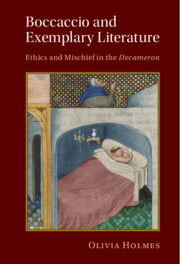Book contents
- Boccaccio and Exemplary Literature
- Cambridge Studies in Medieval Literature
- Boccaccio and Exemplary Literature
- Copyright page
- Epigraph
- Contents
- Acknowledgments
- Introduction
- Chapter 1 Ethical Fables and Antifeminist Exempla
- Chapter 2 From Sermon Story to Novella
- Chapter 3 Lives of Saints; Lives of Sinners
- Chapter 4 Classical and Vernacular Exempla
- Chapter 5 Magister Amoris
- Afterword in Time of Plague
- Notes
- Bibliography
- Index
- Cambridge Studies in Medieval Literature
Chapter 5 - Magister Amoris
Published online by Cambridge University Press: 02 February 2023
- Boccaccio and Exemplary Literature
- Cambridge Studies in Medieval Literature
- Boccaccio and Exemplary Literature
- Copyright page
- Epigraph
- Contents
- Acknowledgments
- Introduction
- Chapter 1 Ethical Fables and Antifeminist Exempla
- Chapter 2 From Sermon Story to Novella
- Chapter 3 Lives of Saints; Lives of Sinners
- Chapter 4 Classical and Vernacular Exempla
- Chapter 5 Magister Amoris
- Afterword in Time of Plague
- Notes
- Bibliography
- Index
- Cambridge Studies in Medieval Literature
Summary
Chapter 5 examines Boccaccio’s authorial defenses in the Decameron in the light of medieval medical and literary prescriptions for lovesickness, such as those in Ovid’s Ars Amatoria and Remedia Amoris, and Andreas Capellanus’ De amore (which Boccaccio has been credited with translating). Like these didactic works, the Decameron can also be seen as teaching both how to recover from an unhappy love affair and how to procure a new liaison, thus aggravating the very ills that it is said to cure. Indeed, the book is presented metaphorically as fighting fire with fire, redressing unrequited desire by offering female readers the solace of a personal relationship with its author. But Boccaccio also recognizes that it useless to try to prevent sexual desire, and the cure may do more harm than good. The chapter’s second half examines stories that seem to draw on the dialogues between lovers of different social statuses in De amore. The attempted seductions are all unsuccessful in Andreas’ hypothetical encounters, but the corresponding novelle tend to end happily and to model healthier, more productive human relationships.
Keywords
- Type
- Chapter
- Information
- Boccaccio and Exemplary LiteratureEthics and Mischief in the <i>Decameron</i>, pp. 174 - 195Publisher: Cambridge University PressPrint publication year: 2023

